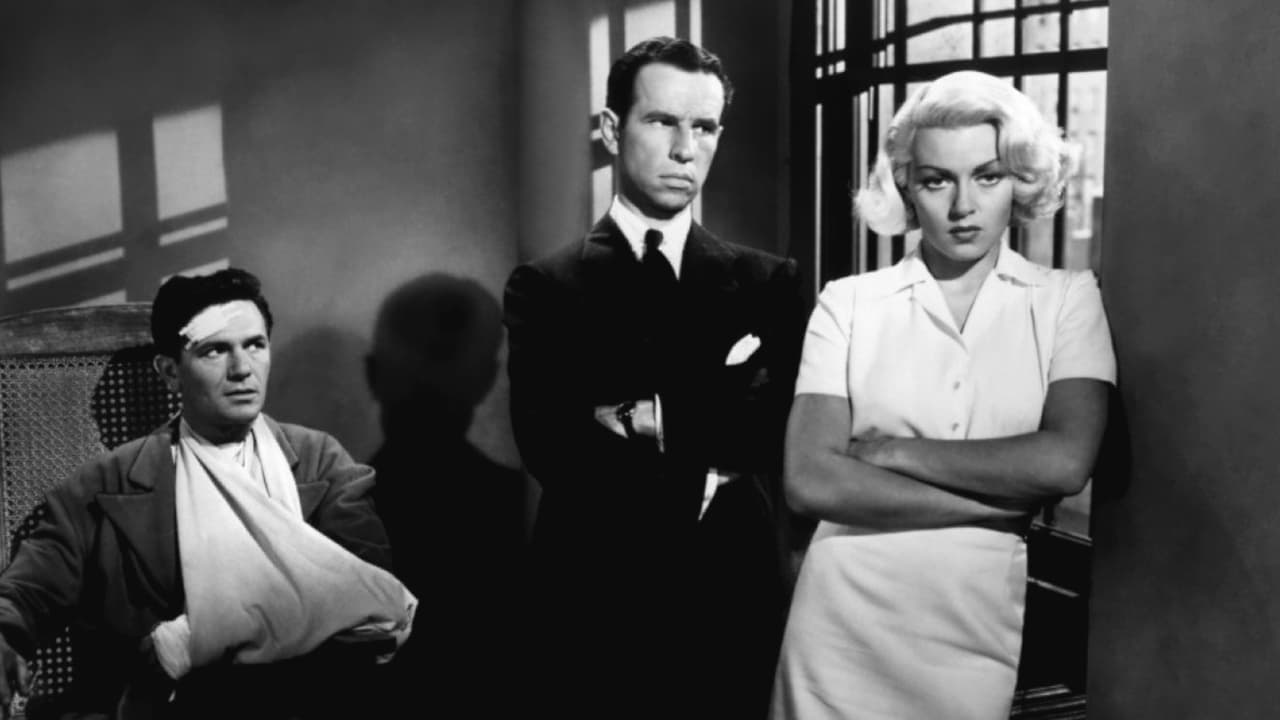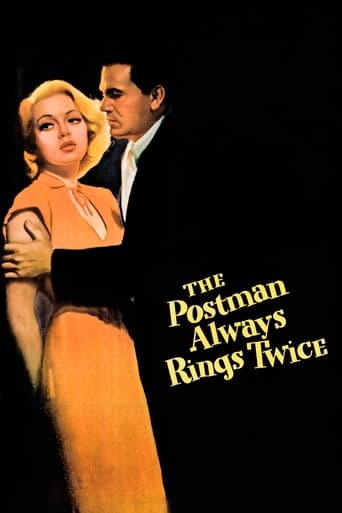

I was surprised to learn that this was the third film version of James M. Cain's 1934 novel "The Postman Always Rings Twice", earlier versions having been made in France in 1939 and (remarkably) in Fascist Italy in 1943. The American version was eventually made by MGM after three other studios (RKO, Warner Brothers and Columbia) had considered filming the novel but had abandoned the idea because they feared possible objections from the Production Code Authority. Neither the French version "Le Dernier Tournant" (The Last Turning) nor the Italian one "Ossessione" (Obsession) actually used Cain's enigmatic title, which is never explained in the novel itself. (No postman appears in it). This film does attempt an explanation, but it is not very convincing and too complicated to set out here.The plot has something in common with "Double Indemnity", another film noir from the mid-forties based on a Cain story. (It was the success of that film which finally persuaded MGM to go ahead). Both films feature seductive but evil women who conspire with their lovers to murder their husbands. Here the lethal seductress is Cora Smith, the beautiful young wife of the owner of a diner just outside Los Angeles. Her lover is Frank Chambers, a drifter who stops to eat at the diner and ends up working there. At first sight Cora's marriage does not seem particularly unhappy; her husband, Nick, is much older than her and physically unattractive, but he is a kindly man who clearly loves her. He does, admittedly, have a drink problem, but he is an amiable drunk, not an aggressive one.Cora, however, feels trapped in a marriage to a man she does not love, and soon after Frank starts working at the diner they begin an affair. Frank's original suggestion is that the two should run away together, but she does not want to exchange a life of comparative affluence for one of poverty. Nick may not be a particularly rich man, but neither is he a poor one like Frank, and Cora does not want to become a "tramp". (She is using the word in its British sense of "hobo", not its more common American one of "sexually immoral woman"- she already is that). They decide that Nick should die so that Cora can inherit his money. The film tells the story of his murder and its aftermath.Like some of her contemporaries, Lana Turner was not so much a Great Actress as a Great Star, although she was capable of giving decent performances as in the later "Imitation of Life". Here as Cora she looks supremely seductive, but this is not really a great performance. To be fair to her, a great performance is not really required as Cora is written as a rather one-dimensional character, a sexy villainess and not a lot else.According to one story, Turner remarked "Couldn't they at least hire someone attractive?" upon learning that John Garfield was to be her co-star. According to another story, her initial reaction did not prevent the two from having a brief affair during filming, but I think that in one respect she was probably right. Garfield never really invests Frank with the sexual magnetism which would be needed to explain why Cora, a woman so attractive that she could have virtually any man she wanted, should have given herself to a penniless drifter. The best acting comes from Cecil Kellaway, who makes the hapless Nick an amiable slob who does nothing to deserve his ruthless treatment at the hands of Cora and Frank, and from Hume Cronyn as the shyster lawyer Arthur Keats.Despite its thematic similarities to "Double Indemnity", one of the all-time great noirs, I have never regarded "The Postman Always Rings Twice" as being in anything like the same class. The first half, dealing with the build-up to Nick's murder, is not too bad, but in the second half, dealing with the trial of Frank and Cora, it starts to descend into absurdity.A lawyer who was a witness (indeed, the only witness apart from the perpetrators) to a crime is permitted to act both as investigating detective and attorney for the prosecution. The same lawyer acts for both defendants, even though each is trying to blame the other for the crime, and tricks one of his own clients into signing a confession. The prosecuting attorney in a capital murder trial agrees to accept a plea of guilty to manslaughter on the basis of virtually no argument at all- it is not even explained whether this is voluntary or involuntary manslaughter. The judge agrees to accept that plea and then allows the defendant to go free on probation, without having to spend a single day in prison. You don't need to be a lawyer to realise that, legally, the whole thing makes very little sense, although the ending is admittedly an ingenious piece of plotting.During their heyday in the forties and fifties films noirs were often regarded as little more than money-making potboilers; "The Postman Always Rings Twice" was a big box-office success. They were not always looked on with favour by the more high-minded critics and, generally speaking, they were not the sort of films which won Oscars. Their star began to rise when they were taken up by the French New Wave directors of the sixties, which explains why a predominantly American genre should have a French name, and today they are often regarded as masterpieces of the cinema. There are some, such as "Double Indemnity", which do indeed deserve such a description, but not every noir was a great film, and the overrated "The Postman Always Rings Twice" has always struck me as one of the lesser ones. 5/10
... View MoreI know that I'm not supposed to ask questions, and I know it was 1946, and Hollywood was playing with Film Noir, but there was just too much about this movie that made me want to yell "STOP ALREADY!!!"Yes, Lana Turner is absolutely breathtaking. She's so sexy in all of those white outfits, and those beautiful eyes and lips. Very sensuous.But do they really expect someone like her to fall for Cecil Kellaway and try to make it believable for the audience? And I'm sorry, but I just never thought that John Garfield was ever that good.Throughout watching this film all I could think of was how it reminded me of "Double Indemnity" (which in my opinion is a much better film, in every aspect).And the moral of the story about the postman? Ridiculous.Don't waste your time with this one, no matter what you read about it.
... View MoreAlthough I've been classic movie buff for years, I only saw this movie a few years ago. I'd heard about it, of course, and seen photos, but hadn't actually gotten around to viewing it. I bought the DVD and it sat on my shelf for a while. When I finally popped into my DVD player, I found myself highly entertained, if a bit mystified by some of the plot twists, some of which made sense, some of which did not. But on the whole, it was essential viewing for a film noir fan, or any fan of Lana Turner or John Garfield.A plot synopsis is unnecessary, because so many other reviewers have already done so, and wonderfully detailed descriptions. The heat that is generated on screen between Turner and Garfield is no myth; from the moment their characters cross paths, there's passion and doom written all over them. The attraction is instant, and with the Production Code in place, the subtlety and innuendo does more than explicit sex scenes could. Although the 1981 film version was able to be truer to the details of James M. Cain's novel, the chemistry between the leads was lacking, and no amount of lurid sex can disguise that. Turner and Garfield were Cora Smith and Frank Chambers, period. Their individual coloring provided an intriguing contrast which also contributed to their on screen dynamic. The rest of the cast, including Cecil Kellaway as Cora's elderly husband, Leon Ames as the District Attorney, Hume Cronyn as the defense lawyer and Audrey Totter as the girl Frank picks up outside a diner, are also no less than stellar.The script makes use of the male voice-over/narration so common in the genre, and it works well since Garfield is in almost every scene. There are questions, though as to the first murder plot and the obvious stupidity of Cora's husband Nick, and the legal wrangling in the courtroom sequences. However, the performances almost make you overlook the plot holes. In the end, Turner, Garfield and the rest of the cast won me over. Cora and Frank are not experienced criminals, and they inevitably make mistakes that end up costing them dearly. But their desire and eventual love for each other never really fades, despite the mistrust and anger that often comes to the surface. The title refers to death coming more than once, and it certainly does in this case.Although the DVD was released by Warner Brothers (John Garfield's home studio at the time), the movie was made by MGM, which may account for the lack of grittiness that is to be expected in film noir. Director Tay Garnett had a fairly long career, but was never considered a top director. Both Lana Turner and John Garfield made their film debuts in the late 1930s; while Turner, the blonde glamour girl who proved she had presence on film to make her one of the screen immortals went on to even greater fame in melodramas (both on screen and off) in the 50s and 60s, Garfield only had a few years left; his heart condition was made worse by his interrogation and blacklisting during the McCarthy witch hunts. He truly never gave a bad performance, and "Postman" is one of his best. He continued to work until the last year of his life, and is considered to be one of the finest actors of his generation, and of course, was one of the first Method actors in film. His early passing was a great loss to the film industry, but the impressive body of work he left behind will undoubtedly endure.It's not a perfect film, but a fascinating one.
... View MoreLana Turner and John Garfield generate quite a bit of heat in this screen adaptation of the 1934 James M. Cain novel.The material is pretty racy stuff for a 1940s audience, which explains why it took over a decade for Hollywood to muster the guts to make it into a film. I already knew John Garfield was a good actor, but I was most impressed with Turner. I'd never given her much credit, always thinking of her as more of a bombshell than an actress, but she's terrific in this.As noirs go it's probably not going to go down as one of my favorites. It's too big-budget, too glossy, too studio for me. I prefer my noirs low-budget and gritty, the ones where it looks like the filmmakers could barely afford the film the movie is printed on. But it's a very good movie in its own right, a faithful and worthy interpretation of Cain's book.Grade: A-
... View More